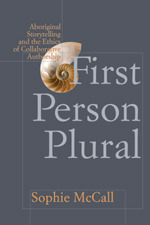
A scholarly examination of “told-to” narratives in the Canadian context, with some longer-ago history but mostly between the 1970s and 1990s. The told-to narrative is an old form that is of particular relevance to colonial contexts, in which white settler scholars and writers have produced written texts from oral stories told to them by Indigienous people. Exactly what this has looked like has varied a lot, from approaches that were intensely and overtly colonial and exploitative, to approaches that were…well, subtley and sophisticatedly colonial and exploitative. To a great extent, analysis of the form has been split between those who unproblematically celebrate it and those who unreservedly condemn it. In this book, McCall examines a range of kinds of texts, most of which are not classic examples of the form but which push us to think more expansively about the dynamics, both colonial and resistant, at play in encounters of listening and telling. So, for instance, she looks in detail at work by Lee Maracle and Alanis Obomsawin in the context of the so-called “Oka crisis”, at official processes like the Berger Inquiry and the Royal Commission on Aboriginal People and the court proceedings that led to the Delgamuukw decision, at both colonial and anti-colonial filmmaking about/by Inuit people, and at various instances of projects that are at least analogous to told-to narratives that are led by Indigenous people themselves. She ends up sketching out a way of understanding told-to narratives and the processes that produce them that is relational and attentive to the range of possibilities for oppression, resistance, and complexly problematic collaboration in such encounters.
I found the book fascinating and useful. For one thing, a lot of the content was really interesting – some of the specific historical events and/or texts I knew a bit about, others I knew less, and it was all great learning. And its ideas are very relevant to a lot of the things that I’m trying to think about, not so much in all of its specifics but in the way that it thinks about listening, authorship, and power. I think it suggests some interesting lines for further thought about what politically responsible listening in social contexts that are inevitably fractured by legacies of injustice and harm, and then speaking/writing that draws on that listening (which almost all speaking/writing about the world inevitably does), might look like.
Originally posted by Scott on Goodreads.